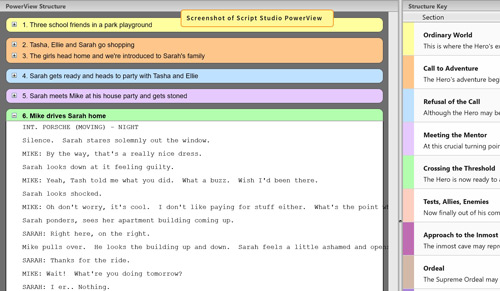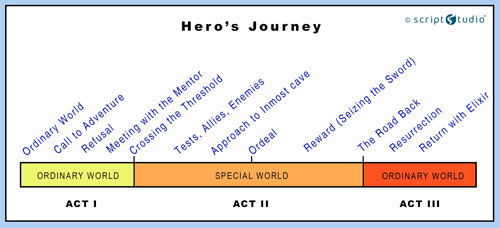To Structure Or Not To Structure? That Is The Question...
Every story has a beginning, a middle and an end. In the beginning you setup your hero (or heroine) and his story, then you throw something at him that is a great source of conflict and takes him into a whole heap of trouble. After facing many foes and overcoming various obstacles the hero saves the day and wins the girl.
If only writing a movie was that easy...
The thing is, there are many forms of structure and some writers subscribe to one formula, while others subscribe to another. Some try not to subscribe to any and see the whole idea of structure as "evil", feeling that a story should evolve organically without rules confining ideas or obstructing the creative flow.

In the end, a story should dictate the kind of structure it follows or whether it shouldn't follow a structure at all. There's no point trying to write a comedy and forcing the structure of a thriller upon it - it won't work. Well, theoretically it won't but I'm sure someone will find a way! Let your characters define the story and your story define your structure and then use a formula if necessary to tighten your script. The trick is to initially let the ideas flow without paying too much attention to structure and then in your second pass begin to focus your story and separate the wheat from the chaff.
The 12 Stages of The Hero's Journey
A popular form of structure derived from Joseph Campbell's Monomyth from his book The Hero With A Thousand Faces and adapted by Christopher Vogler is the Twelve Stage Hero's Journey. This is essentially a more detailed Character Arc for your story's hero which is overlayed onto the more traditional three-act structure that many successful Hollywood movies such as Star Wars and The Wizard of Oz when analyzed appear to follow.

1. Ordinary World
This is where the Hero's exists before his present story begins, oblivious of the adventures to come. It's his safe place. His everyday life where we learn crucial details about our Hero, his true nature, capabilities and outlook on life. This anchors the Hero as a human, just like you and me, and makes it easier for us to identify with him and hence later, empathize with his plight.
2. Call To Adventure
The Hero's adventure begins when he receives a call to action, such as a direct threat to his safety, his family, his way of life or to the peace of the community in which he lives. It may not be as dramatic as a gunshot, but simply a phone call or conversation but whatever the call is, and however it manifests itself, it ultimately disrupts the comfort of the Hero's Ordinary World and presents a challenge or quest that must be undertaken.
3. Refusal Of The Call
Although the Hero may be eager to accept the quest, at this stage he will have fears that need overcoming. Second thoughts or even deep personal doubts as to whether or not he is up to the challenge. When this happens, the Hero will refuse the call and as a result may suffer somehow. The problem he faces may seem to much to handle and the comfort of home far more attractive than the perilous road ahead. This would also be our own response and once again helps us bond further with the reluctant Hero.
4. Meeting The Mentor
At this crucial turning point where the Hero desperately needs guidance he meets a mentor figure who gives him something he needs. He could be given an object of great importance, insight into the dilemma he faces, wise advice, practical training or even self-confidence. Whatever the mentor provides the Hero with it serves to dispel his doubts and fears and give him the strength and courage to begin his quest.
5. Crossing The Threshold
The Hero is now ready to act upon his call to adventure and truly begin his quest, whether it be physical, spiritual or emotional. He may go willingly or he may be pushed, but either way he finally crosses the threshold between the world he is familiar with and that which he is not. It may be leaving home for the first time in his life or just doing something he has always been scared to do. However the threshold presents itself, this action signifies the Hero's commitment to his journey an whatever it may have in store for him.
6. Tests, Allies, Enemies
Now finally out of his comfort zone the Hero is confronted with an ever more difficult series of challenges that test him in a variety of ways. Obstacles are thrown across his path; whether they be physical hurdles or people bent on thwarting his progress, the Hero must overcome each challenge he is presented with on the journey towards his ultimate goal.
The Hero needs to find out who can be trusted and who can't. He may earn allies and meet enemies who will, each in their own way, help prepare him for the greater ordeals yet to come. This is the stage where his skills and/or powers are tested and every obstacle that he faces helps us gain a deeper insight into his character and ultimately identify with him even more.
7. Approach To The Inmost Cave
The inmost cave may represent many things in the Hero's story such as an actual location in which lies a terrible danger or an inner conflict which up until now the Hero has not had to face. As the Hero approaches the cave he must make final preparations before taking that final leap into the great unknown.
At the threshold to the inmost cave the Hero may once again face some of the doubts and fears that first surfaced upon his call to adventure. He may need some time to reflect upon his journey and the treacherous road ahead in order to find the courage to continue. This brief respite helps the audience understand the magnitude of the ordeal that awaits the Hero and escalates the tension in anticipation of his ultimate test.
8. Ordeal
The Supreme Ordeal may be a dangerous physical test or a deep inner crisis that the Hero must face in order to survive or for the world in which the Hero lives to continue to exist. Whether it be facing his greatest fear or most deadly foe, the Hero must draw upon all of his skills and his experiences gathered upon the path to the inmost cave in order to overcome his most difficulty challenge.
Only through some form of "death" can the Hero be reborn, experiencing a metaphorical resurrection that somehow grants him greater power or insight necessary in order to fulfill his destiny or reach his journey's end. This is the high-point of the Hero's story and where everything he holds dear is put on the line. If he fails, he will either die or life as he knows it will never be the same again.
9. Reward (Seizing The Sword)
After defeating the enemy, surviving death and finally overcoming his greatest personal challenge, the Hero is ultimately transformed into a new state, emerging from battle as a stronger person and often with a prize.
The Reward may come in many forms: an object of great importance or power, a secret, greater knowledge or insight, or even reconciliation with a loved one or ally. Whatever the treasure, which may well facilitate his return to the Ordinary World, the Hero must quickly put celebrations aside and prepare for the last leg of his journey.
10. The Road Back
This stage in the Hero's journey represents a reverse echo of the Call to Adventure in which the Hero had to cross the first threshold. Now he must return home with his reward but this time the anticipation of danger is replaced with that of acclaim and perhaps vindication, absolution or even exoneration.
But the Hero's journey is not yet over and he may still need one last push back into the Ordinary World. The moment before the Hero finally commits to the last stage of his journey may be a moment in which he must choose between his own personal objective and that of a Higher Cause.
11. Resurrection
This is the climax in which the Hero must have his final and most dangerous encounter with death. The final battle also represents something far greater than the Hero's own existence with its outcome having far-reaching consequences to his Ordinary World and the lives of those he left behind.
If he fails, others will suffer and this not only places more weight upon his shoulders but in a movie, grips the audience so that they too feel part of the conflict and share the Hero's hopes, fears and trepidation. Ultimately the Hero will succeed, destroy his enemy and emerge from battle cleansed and reborn.
12. Return With The Elixir
This is the final stage of the Hero's journey in which he returns home to his Ordinary World a changed man. He will have grown as a person, learned many things, faced many terrible dangers and even death but now looks forward to the start of a new life. His return may bring fresh hope to those he left behind, a direct solution to their problems or perhaps a new perspective for everyone to consider.
The final reward that he obtains may be literal or metaphoric. It could be a cause for celebration, self-realization or an end to strife, but whatever it is it represents three things: change, success and proof of his journey. The return home also signals the need for resolution for the story's other key players. The Hero's doubters will be ostracized, his enemies punished and his allies rewarded. Ultimately the Hero will return to where he started but things will clearly never be the same again.
Structuring With Color Using Script Studio's PowerView

Script Studio includes five default customizable templates:
- Hero's Journey
- 3 Act Screenplay
- 5 Act Stage Play
- One Hour TV Drama
- Half-Hour TV Sitcom
Each sample template is designed to help you structure your story and they include comprehensive information about each section, helping you understand how a particular type of story narrative works. They are, however, merely a guide and should not be rigidly adhered to. Creativity is far more important than sticking to a "formula" but they can help you pace your story and troubleshoot rewrites.
The default templates can be modified to suit your project's needs and you can even create your own templates from scratch or save templates from one project for use in another.
Download a FREE Demo of Script Studio to see how its powerful screenplay formatting, character development and story structuring tools can help you make a better script!
Dan Bronzite
Dan is a produced screenwriter and award-winning filmmaker, CEO of Buckle Up Entertainment, Nuvotech and creator of Script Studio screenwriting software.
His writing credits and written numerous specs and commissioned feature scripts including screenplay adaptations of Andrea Badenoch's Driven and Irvine Welsh's gritty and darkly comic novel Filth.
Dan is a contributor to Script Magazine and has also directed three award-winning short films including his most recent All That Glitters which garnered over 50 international film festival selections and 32 awards.
His supernatural horror feature Long Time Dead for Working Title Films was released internationally through Universal and his spec horror Do or Die sold to Qwerty Films.
He is currently setting up his directorial feature debut and various US and UK feature and series projects.